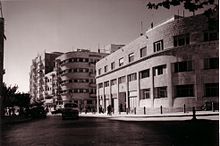Moshe Dwek (Hebrew: משה דואק (1931-2003) was an Israeli political activist who threw a hand grenade in the Knesset in 1957, wounding the prime minister and several ministers. After 15 years in prison, he established a party and ran for the 12th Knesset but did not pass the electoral threshold.
Biography
Moshe Dwek was born in Aleppo, Mandatory Syria, to a Jewish family. At the age of 13, he was part of a group of Jewish boys that immigrated to Mandate Palestine He initially lived on kibbutz Dorot, then on kibbutz Glil Yam. He fought in the 1948 Arab-Israeli War. In 1950, his parents and brothers immigrated to Israel, settling in Pardesiya.
Grenade attack

On October 29, 1957, while the Knesset (then located in Frumin House in downtown Jerusalem) was in session, Dwek, who was standing on a balcony, threw a grenade he had stolen from the army into the chamber. The grenade exploded and seriously injured Rabbi Haim-Moshe Shapira of the National Religious Party. Prime Minister David Ben-Gurion, Foreign Minister Golda Meir, and Transport Minister Moshe Carmel were injured by shrapnel. The grenade that Moshe Dwek threw had been intended for Ben-Gurion and Meir. Dwek later asked Shapira for forgiveness. Dwek's assassination attempt resulted in the establishment of the Knesset Guard and Shin Bet's VIP protection unit. The incident was allegedly prompted by Dwek's inability to receive national insurance for his declining health, and was apparently not prompted by larger political issues. Although he was portrayed as psychologically unbalanced, a panel of experts agreed that he was fit to stand trial and he was sentenced to 15 years in prison, part of which he spent in a psychiatric hospital. Requests for a retrial were rejected. After 10 years, Dwek requested a pardon, but this was denied. A slightly different account, published in 1959, gives his name as Moshe Ben Yaakov Dueg, aged 25 years old. This version says he suffered an accident in childhood that left him mentally unbalanced. He had another accident in a youth camp after coming to Palestine just before the founding of the state of Israel. He then tried to sue the Jewish Agency for $66,000. After losing the case he sent threatening letters to the judge and was arrested. He was found unfit for trial. In another incident he tried to stowaway on a plane to New York City. He had no party affiliations. Following the grenade attack, Ben-Gurion wrote a personal letter to his parents, who were living in a hut, without electricity, in a village near Tel Aviv. They spoke only Arabic and the courier translated the letter for them.
Political career
| This section of a biography of a living person does not include any references or sources. Please help by adding reliable sources. Contentious material about living people that is unsourced or poorly sourced must be removed immediately. Find sources: "Moshe Dwek" – news · newspapers · books · scholar · JSTOR (November 2023) (Learn how and when to remove this message) |
Dwek later started his own political party, which he named Tarshish, and ran for the Knesset in 1988. The party platform called for an end to Ashkenazi hegemony, and integrating the Sephardic and Mizrahi Jews into the leadership by giving them half of all government ministries, as well as widespread representation in the Knesset, municipalities, and the Jewish Agency. Its other demands included setting up a university, college, and a religious polytechnic institute in the coastal city of Netanya. He is remembered for his unusual TV advertisements, which would start off with Dwek chanting the words No'ar, No'ar, No'ar (literally "youth, youth, youth"). Gaining only 1,654 votes for Tarshish, Dwek failed in his attempt to win a seat in the 12th Knesset.
See also
1988 Israeli legislative election
References
- Newly Recovered Historic Treasure Reveals David Ben-Gurion's Unlikely Correspondence With His Would-be Assassin
- Minister Shapiro Was Wounded in the Knesset
- "NRG מעריב". nrg.co.il.
- "Highlights of the Third Knesset (1955-1959)".
- Newly Recovered Historic Treasure Reveals David Ben-Gurion's Unlikely Correspondence With His Would-be Assassin
- St. John, Robert (1959). Ben-Gurion. Jarrods (Hutchinson), London. pp. 304–307.
- 1930s births
- Living people
- People from Aleppo
- Israeli military personnel of the 1948 Arab–Israeli War
- Israeli people of Syrian-Jewish descent
- Syrian Jews
- Syrian emigrants to Israel
- Israeli Mizrahi Jews
- Israeli criminals
- Leaders of political parties in Israel
- Failed assassins of heads of government
- Prisoners and detainees of Israel